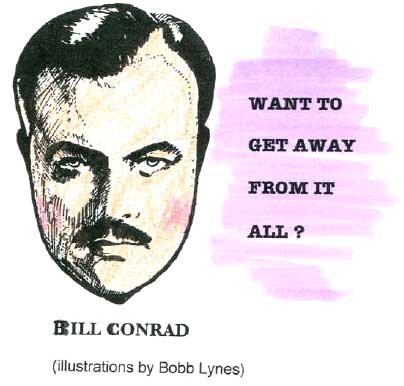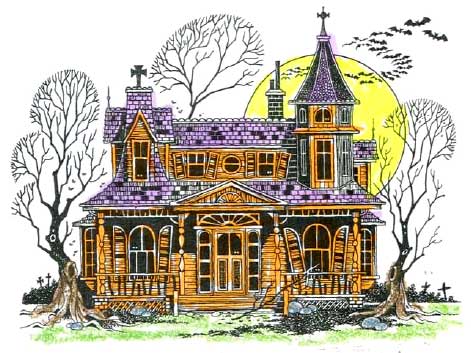|

This story was published in Radio Recall, the journal of the Metropolitan Washington Old-Time Radio Club, published six times per year.
Click here to return to the index of selected articles.
|
|
WE OFFER YOU... ESCAPE!
By Stewart Wright © 2011
(From Radio Recall, August 2011)
Radio has often been called "The Theatre of the Mind." Few series from the Golden Age of Radio rivaled Escape in the ability to combine acting, scripts, music, direction, and sound effects to transport the audience anywhere in the world, or, in some cases, out of this world, and place them in the middle of impossible situations. What other anthology series could have listeners cornered by a deadly Bushmaster snake on a cruise ship in Tropical waters on one show, "A Shipment of Mute Fate" and the next week, in "Action" have them hanging by their fingertips on the sheer face of an ice cliff in the Alps?
Them Schedule Changes
Escape was the wandering vagabond of CBS series during its seven-year, 228 episode run. The series aired on every day of the week and in a total of ten different time slots. It is little wonder that, with all these scheduling changes, that Escape had trouble attracting sponsors, developing strong ratings, and a loyal audience. During its entire run, the series only had a single significant period of sponsorship, four months in 1950 by the Richfield Oil Corporation.
Sunday was the most common day of airing with 103 Escape episodes being broadcast on that day; Saturday and Wednesday were the next most common broadcast days with 27 episodes each. Escape generally aired relatively late in the evening with 183 episodes starting at 9:00 PM or later. (All times used in this article are Eastern Time Zone.)
Quite frequently, runs of Escape were short. Several times the series was a Summer replacement. There were long gaps, ranging from a few months to one of over a year between the various portions of the series' run. Only once did Escape remain on the air for an entire year in the same time slot: Sundays at 9:30 PM Eastern Time from 10/12/1952 to 10/04/1953.
The Opening and . . . The Voice
Escape hooked the audience from its unique opening, which had gradually evolved over time into an anonymous Voice (which became known as The Voice of Escape) that was soothing, but at the same time somehow menacing and dangerous that asked some seemingly innocuous questions:
"Tired of the everyday routine?
Ever dream of a life of romantic adventure?
Want to get away from it all?"
Followed by the announcer dramatically stating:
"We offer you. . . Escape! ....Escape!. . . designed to free you from the four walls of Today for a half hour of High Adventure."
The Voice then returned to pull the listener into that night's episode such as in the 1953 production of "Wild Jack Rhett":
"You are standing in a moonlit street of a Western cow town. . . alone and friendless. While moving slowly down on You. . . their horses crowding every exit, is a band of killers. . . each one of whom has been paid to shoot You dead."
When combined with the music, it made for an opening which was most memorable.

While The Voice of Escape was performed by many actors, it was most frequently and memorably done by two actors: William Conrad and Paul Frees. Their voices seem to add just the right qualities of menace, danger, and adventure.
The Stories
Escape featured a superb mix of adaptations of novels and short stories and original scripts. The adaptations were done by some of radio's finest writers. Later, some of these adaptors and other writers would pen original stories for the series.
The initial run of the series, 07/07/1947 - 08/18/1947, featured adaptations of classic and contemporary fiction that set the standard for quality scripts that would be a hallmark of Escape. Four of the episodes were Les Crutchfield adaptations of classic stories by: Rudyard Kipling – "The Man Who Would Be King", Joseph Conrad – "Typhoon", Robert Louis Stevenson – "Sire de Maletroit's Door", and Arthur Conan Doyle – "The Ring of Thoth".
The other three episodes were adaptations of more recent fiction: "Operation Fleur De Lys" by Stewart Alsop & Thomas Bradon (adapted by William N. Robson), "The Diamond As Big As The Ritz" by F. Scott Fitzgerald (adapted by Les Crutchfield), and "The Fourth Man" by John Russell (adapted by Irving Ravetch.)
Through the end of 1949 the stories aired on Escape were almost exclusively adaptations of classic and contemporary fiction. Adaptations would remain a staple during the series' entire run. Three radio classic adaptations had their first airings on the series: "Leiningen Versus the Ants", "A Shipment of Mute Fate", and "Three Skeleton Key" would terrify and captivate audiences and would be reprised on Escape and other series. Adaptations of many genres of literature were aired on Escape.
Here are just a few examples:
SCIENCE FICTION – "The Time Machine", "Mars Is Heaven" and "The Outer Limit";
HORROR – "The Fall of the House of Usher", "Ancient Sorceries", and "Snake Doctor";
WESTERN – "Command" and "Wild Jack Rhett";
ESPIONAGE – "The Great Impersonation" and "Confidential Agent";
CRIME – "When the Man Comes, Follow Him" and "Crossing Paris".
Starting in 1950, original radio plays began to air on Escape and they too would run a wide range of genres. Some of these original plays were "The Man from Tomorrow" by Irving Reis, "Sundown" by Joel Murcott, "The Sure Thing" by John and Gwen Bagni, "North of Polaris" by Charles Smith, "Train from Oebisfelde" by Ross Murray, "Violent Night" by Les Crutchfield, "Pressure" by Richard Chandlee, and "The Island" by Millard Kaufman. Several of these original radio plays would be reproduced on other series.

Script Re-Use
During its network run, 28 scripts were reused on Escape. Each reuse was a new production and not simply a repeat broadcast of earlier aired episodes. These new productions usually had some rewritten dialog and included new cast and crew members. These initial script uses and subsequent reuses accounted for a total of 64 episodes.
One script, "A Shipment of Mute Fate", was used four times on the series with a different actor playing the lead role in each production: Jack Webb (10/15/1947), Harry Bartell (3/28/1948), John Lund (3/13/1949), and David Ellis (7/7/1950.)
Six scripts were used three times: "The Country of the Blind", "Evening Primrose", "The Fourth Man", "Leiningen Versus the Ants", "Three Skeleton Key", and "The Diamond As Big As The Ritz". The productions of the latter script was unusual in that the lead role of John Unger was played by brothers: Jack Edwards on 7/21/1947 and Sam Edwards on 8/29/1948 and 3/27/1949.
The quality of the scripts used on Escape was confirmed by the later reuse of many of them on other series. Twenty-nine Escape scripts were subsequently produced on Suspense. The following are a few examples. Classic Escape scripts "A Shipment of Mute Fate", "Three Skeleton Key", "Country of the Blind", and "Leiningen Versus The Ants" were later used on that series. Director William N. Robson adapted an Ambrose Bierce short story, "An Occurrence at Owl Creek Bridge", for Escape in 1947 and later reused the adaptation three times while he served as the director of Suspense.
Actor John Dehner penned two scripts: "The Man With The Steel Teeth" and "Lily and the Colonel", that were initially produced on Escape by director Antony Ellis and later reused by Ellis when he directed Suspense. Script alterations were made in the series openings and closings, and dialog, cast and crew changes were made.
The Herb Purdum script "Macao" was first produced on Escape on 07/18/1951 and approximately a year later was produced on Romance as "The Red Angel". For the Romance production, Purdum made significant changes to the final act.
Antony Ellis also reused some Escape scripts on the various series he directed. When he was the director of Suspense, he reused some scripts from the time period when he wrote for and directed Escape: "The Game", "A Study In Wax", and "Classified Secret". Ellis also wrote "The Cave" which was used on at least three series: first Escape, then Suspense, and finally Romance.
When "The Cave" was produced on the latter two series, Ellis was also the series director.
Missing Episodes: Real and Imagined
All but a handful of Escape episodes are in circulation. Those episodes that are not in circulation are "The Run of the Yellow Mail', "The Primitive", "The Blue Wall", "The Big Sponge", "Transport to Terror", "Pagosa", "Nightmare In The Sun", "Dangerous Man", "The Blue Hotel", and "One-Eighth Apache".
There were several stories that were announced on Escape as upcoming episodes, but were never broadcast. Most of these shows had proceeded in the production process as far as a draft script, however there is no indication that any of these shows were ever cast, rehearsed, or recorded. These shows are: "The Haunted Man", "The Canterville Ghost", "Grand Canyon Suite", and "Mute Witness".
And now. . . , we offer you . . . new information about an episode that never was part of Escape. Often reputed to be a lost Escape episode, "Your Grandfather’s Necktie", is commonly listed in Escape logs as a special broadcast that either aired on 08/26/1950 or 08/31/1950. Research in 2008 by the article author has determined that "Your Grandfather's Necktie" was not an Escape episode, but was actually an episode of the series Stars Over Hollywood which aired on August 26, 1950 and starred Alan Young. This information was verified by consulting the original Escape scripts, director Norman Macdonnell’s personal papers, and period Radio Programs Listing Sections from the New York Times and several other newspapers.
The Players
While Escape did not frequently feature big-name stars, the series did possess an outstanding "company" of regular performers. Its "company" included many of the finest West Coast vocal talent such as Parley Baer, Joan Banks, Michael Ann Barrett, Tony Barrett, Edgar Barrier, Harry Bartell, Jeanne Bates, Herb Butterfield, Lillian Buyeff, William Conrad, Hans Conried, Jeff Corey, Ted de Corsia, Don Diamond, Lawrence Dobkin, Paul Dubov, Sam Edwards, Georgia Ellis, Paul Frees, Will Geer, Virginia Gregg, Wilms Herbert, Ramsey Hill, Vivi Janiss, Bill Johnstone, Joseph Kearns, Berry Kroeger, Lou Krugman, Jack Kruschen, Peter Leeds, Frank Lovejoy, Charles Lung, Jeanette Nolan, Jay Novello, Vic Perrin, Barney Phillips, Luis Van Rooten, Jack Webb, Peggy Webber, Ben Wright, and Barton Yarborough.
Over the years I have been fortunate to hear many actors talk about the Golden Age of Radio and their favorite series. Several of those actors mentioned Escape as one of the series on which they most enjoyed performing.
Perhaps Harry Bartell best summed up how actors felt about the series. In a 1998 interview Harry shared his feelings with me about Escape, “The scripts were wonderful, many of them were based on Classics that stood the test of time. They offered me, as an actor, parts that I never would have gotten on any other program. They were exciting, fun to do and very rewarding from a performance standpoint.”
(This article is continued in our next issue.)
|